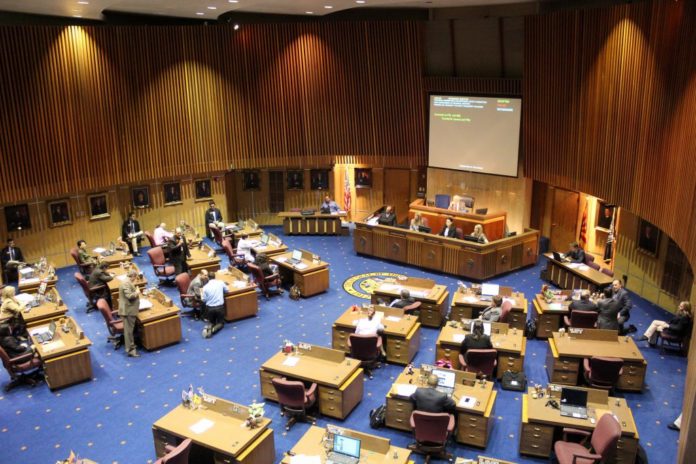A plan to quickly pass a basic state budget and a series of critical bills by the end of the week to ensure the state has funding until the coronavirus crisis ebbs was coming together in the Arizona Legislature Monday.
Republican House Speaker Rusty Bowers told his members that the “baseline” budget would include no policy changes like tax cuts but provide required funding increases that are baked into the budget. Anything controversial is off the table for now, he said. More than two dozen critical bills such as those to keep agencies running would need to pass this week in addition to the budget to keep government functioning.
The Senate was working out a similar plan, but Republican Senate President Karen Fann had a slightly different timeline than Bowers.
Bowers said the hope was “to get out of here in a couple days” with hopes of returning once the financial toll is clearer. “That will give time to see how the state is functioning,” he said.
Fann spoke in early evening and said she believed the Legislature could pass a basic budget, a series of agency-related bills and several other emergency items by the end of the week.
Those emergency items include fixes to unemployment insurance so the state can offer it to workers who are temporarily out of a job because of the crisis and solving problems to education caused by the school shutdown, such as potential waivers to mandatory testing and minimum school days.
The basic budget would not include tax cuts many Republicans want or new spending that is always a part of budget negotiations. Instead, it would fund basic state costs with an annual inflation boost.
Fann said Republicans and Democrats were working together to address the issues. She didn’t mention adjourning until the coronavirus crisis ebbs like Bowers did, but did say there may not be enough members to do substantive work next week.
“This is a time for Rs and Ds to pull together,” Fann said. “We don’t know if Monday or the following week whether we’ll have enough people that will even be here to be able to do a quorum, much less pass a vote.
“So we have to have something that we can get on board with that makes sure government stays open, people still get their paychecks.”
It will likely take at least until May for the revenue damage done to the state’s coffers to start to emerge. Dozens of major events, including the final week of Spring training and all major league sports, have been cancelled. Arizona’s tourist season is at its peak and the hit to hotels, car rental agencies and other service providers will likely be large. New federal guidance that could close restaurants and bars was just announced Monday, and Gov. Doug Ducey is considering how to deal with that directive.
School closures and other major disruptions will also surely affect the state’s economy.
Forcing the hand of leaders was the decision by two Republican senators not to return to the Capitol this week to avoid potential virus exposure. A Democratic House member, Dr. Amish Shah, announced he would not return because of his potential exposure as an emergency room physician. He said he hopes to participate by phone or video when possible. And others were absent Monday.
House and Senate leaders have banned the public from proceedings.
For most people, the new coronavirus causes only mild or moderate symptoms, such as fever and cough. For some, especially older adults and people with existing health problems, it can cause more severe illness, including pneumonia.
The vast majority of people recover from the new virus. According to the World Health Organization, people with mild illness recover in about two weeks, while those with more severe illness may take three to six weeks to recover. In mainland China, where the virus first exploded, more than 80,000 people have been diagnosed and more than 58,000 have so far recovered.
Arizona had tallied 18 confirmed cases of the new virus as of Monday, but no deaths.
Gov. Doug Ducey and state schools chief Kathy Hoffman on Sunday ordered all public and private K-12 schools closed, meaning 1.1 million children are now sitting at home or in alternative care situations.
Republished with the Permission of the Associated Press.














